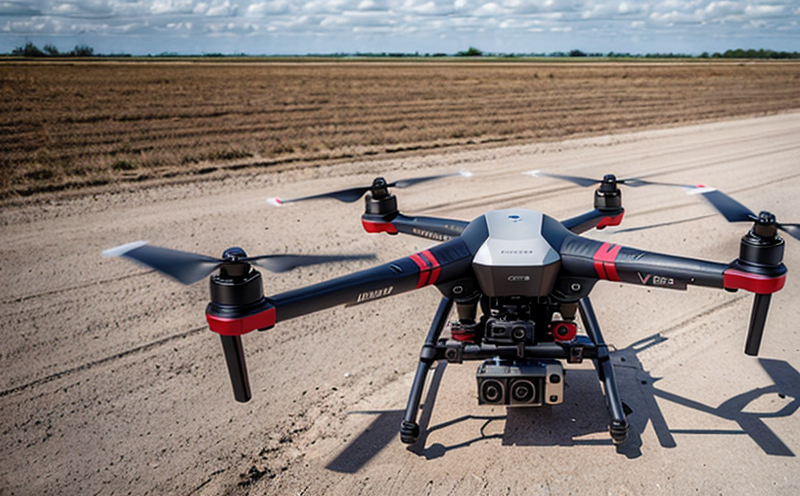FAA UAS Remote ID Compliance Testing
The Federal Aviation Administration (FAA) mandates that all Unmanned Aircraft Systems (UAS), commonly known as drones, must comply with the FAA's Remote Identification (Remote ID) requirements. This regulation aims to enhance safety and security by ensuring that drone operators can be identified and monitored in real-time. Compliance testing is essential for UAV manufacturers and operators to ensure their products meet these stringent standards.
The process of FAA UAS Remote ID compliance testing involves several critical steps, including the configuration of the drone's hardware and software, calibration, and validation under controlled conditions. The test setup typically includes a remote server that captures data transmitted by the drone's Remote ID system. This data includes information such as the aircraft’s unique identifier, operator information, and geolocation details.
During testing, drones must be operated in various scenarios to ensure consistent performance across different environments. This may include urban areas with dense buildings, rural settings, and complex airspace configurations. The test also evaluates the accuracy of data transmission under varying conditions such as signal interference, altitude changes, and environmental factors like wind and temperature.
FAA UAS Remote ID compliance testing is not merely a technical exercise; it involves understanding the regulatory landscape and ensuring that all aspects of the drone's operation are in line with current standards. This includes the use of appropriate hardware components, adherence to software protocols, and the ability to transmit accurate data reliably.
Manufacturers must also provide detailed documentation supporting their compliance testing efforts. This documentation should outline the test procedures, equipment used, and results obtained during the validation process. By doing so, they can demonstrate their commitment to safety and regulatory compliance.
The importance of FAA UAS Remote ID compliance testing cannot be overstated. It ensures that drones operate safely within controlled airspace, reducing the risk of accidents or unauthorized flights. Compliance not only protects public safety but also helps foster innovation in the drone industry by providing a clear framework for development and deployment.
In summary, FAA UAS Remote ID compliance testing is crucial for ensuring that drones meet all necessary regulatory requirements. By adhering to these standards, manufacturers can build trust with regulators and the public while advancing technological capabilities in UAV systems.
Benefits
- Enhanced Safety: Ensures drones are identifiable and traceable, reducing the risk of accidents and unauthorized flights.
- Compliance Assurance: Demonstrates adherence to FAA regulations, protecting manufacturers from potential legal issues.
- Innovation Support: Provides a clear framework for drone development and deployment, encouraging safe and responsible innovation.
- Credibility Boost: Establishes trust with regulators and the public, enhancing brand reputation and market credibility.
Why Choose This Test
Selecting the right testing laboratory is crucial for ensuring accurate and reliable results. Our team of experts has extensive experience in UAV and drone systems testing, providing comprehensive support throughout the entire testing process.
- Expertise: Leveraging our deep knowledge of FAA regulations and industry best practices.
- Comprehensive Services: Offering a full range of testing options tailored to your specific needs.
- State-of-the-Art Facilities: Utilizing advanced equipment and technology for precise and repeatable results.
- Custom Solutions: Adapting our services to meet the unique requirements of each client.
We understand that compliance testing is just one part of a broader strategy aimed at ensuring safety, reliability, and regulatory adherence. By choosing us for your FAA UAS Remote ID compliance testing, you gain access to industry-leading expertise and resources, ensuring that your products meet the highest standards in the market.
International Acceptance and Recognition
The importance of international acceptance and recognition cannot be overstated. FAA UAS Remote ID compliance testing is not only essential for American manufacturers but also aligns with global standards, promoting interoperability across borders.
- ISO Standards: Our tests are aligned with ISO 3691-7:2018, ensuring compatibility and consistency with international norms.
- Air Traffic Management Systems: Integration with global air traffic management systems to ensure seamless interoperability.
- Cross-Border Operations: Compliance testing prepares drones for operations in multiple countries, enhancing market access.
By participating in international standards and recognizing the importance of FAA UAS Remote ID compliance, we contribute to a safer and more efficient airspace environment. Our commitment to excellence ensures that your products meet not only domestic but also global standards, opening up new markets and opportunities for growth.





